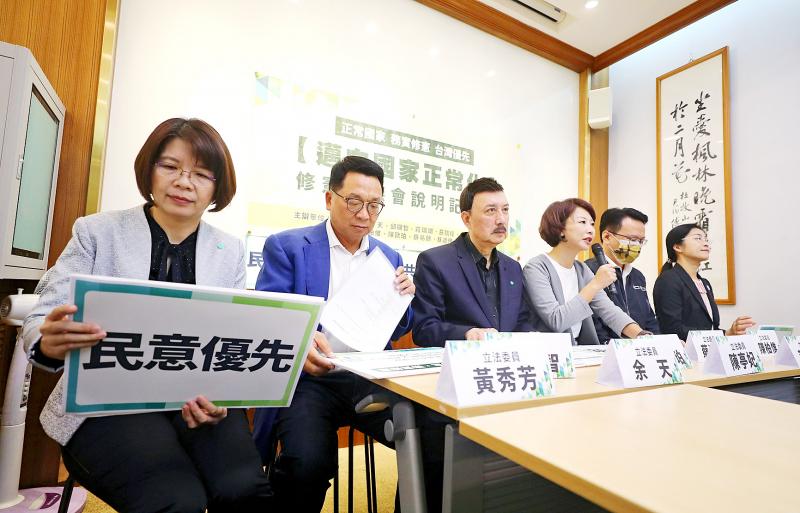Recommendations for amendments to the Constitution and plans for public hearings to solicit input from across society were presented at the legislature in Taipei yesterday by lawmakers from the Democratic Progressive Party (DPP) and other parties.
DPP Legislator Chen Ting-fei (陳亭妃) outlined several main recommendations, including changes to define the nation’s territory and existing national boundaries in Article 4 of the Constitution, and to amend a call for “national unification” in the Preamble to the Additional Articles of the Constitution, which was added in 2005.
Chen and Legislator Tsai Shih-ying (蔡適應), who also attended, are members of the DPP’s Taiwan Normal Country Promotion Association, which is headed by Legislative Speaker You Si-kun (游錫堃).

Photo: CNA
The DPP lawmakers proposed abolishing references to the nation as a “province,” and adding provisions to require that the nation be referred to as Taiwan in foreign affairs, when joining international organizations and when conducting humanitarian aid abroad.
When asked about removing references to “national unification” from the Constitution, Chen said that the wording was a holdover from the Chinese Civil War, the arrival of the former Chinese Nationalist Party (KMT) government and its troops from China, and the imposition of martial law in Taiwan.
Martial law was lifted in 1987.
“With martial law having ended as Taiwan transitioned into a democracy, the aim of ‘national unification’ is history,” Chen said, “Taiwan must not remain burdened by that history by the constitutional framework. The call for ‘national unification’ is no longer fitting in the political and social realities of today.”
DPP legislators Yu Tian (余天), Huang Hsiu-fang (黃秀芳), Chen Ou-po (陳歐珀), Chuang Ching-cheng (莊競程) and Chen Hsiu-pao (陳秀?) also signed the draft proposal and attended the news briefing, along with New Power Party (NPP) caucus whip Chiu Hsien-chih (邱顯智), who said that other NPP legislators, including Claire Wang (王婉諭) and Chen Jiau-hua (陳椒華), also backed the proposal.
Independent Legislator Freddy Lim (林昶佐) and Taiwan Statebuilding Party Legislator Chen Po-wei (陳柏惟) were also named as signatories on the DPP association’s proposal.
Four public hearings have been planned for next month, at which people from across society would be able to voice their opinions on possible amendments to the Constitution, Yu said.
The public hearings would focus on four themes: “Upgrading digital information and governance innovation,” “balanced national land development,” “deepening democracy through pragmatic constitutional amendments” and “using the name Taiwan to link up with the world,” he said.
Amending the Constitution to fix references to the “nation’s territory” and “existing national boundaries” is necessary, because a claim to all of China by the former KMT government is obsolete, Chen Ou-po said.
No nation agrees with such claims by Taiwan, because the People’s Republic of China is the internationally recognized legitimate government of China, he said.

Chinese Nationalist Party (KMT) Chairman Eric Chu (朱立倫), spokeswoman Yang Chih-yu (楊智伃) and Legislator Hsieh Lung-chieh (謝龍介) would be summoned by police for questioning for leading an illegal assembly on Thursday evening last week, Minister of the Interior Liu Shyh-fang (劉世芳) said today. The three KMT officials led an assembly outside the Taipei City Prosecutors’ Office, a restricted area where public assembly is not allowed, protesting the questioning of several KMT staff and searches of KMT headquarters and offices in a recall petition forgery case. Chu, Yang and Hsieh are all suspected of contravening the Assembly and Parade Act (集會遊行法) by holding

PRAISE: Japanese visitor Takashi Kubota said the Taiwanese temple architecture images showcased in the AI Art Gallery were the most impressive displays he saw Taiwan does not have an official pavilion at the World Expo in Osaka, Japan, because of its diplomatic predicament, but the government-backed Tech World pavilion is drawing interest with its unique recreations of works by Taiwanese artists. The pavilion features an artificial intelligence (AI)-based art gallery showcasing works of famous Taiwanese artists from the Japanese colonial period using innovative technologies. Among its main simulated displays are Eastern gouache paintings by Chen Chin (陳進), Lin Yu-shan (林玉山) and Kuo Hsueh-hu (郭雪湖), who were the three young Taiwanese painters selected for the East Asian Painting exhibition in 1927. Gouache is a water-based

Taiwan would welcome the return of Honduras as a diplomatic ally if its next president decides to make such a move, Minister of Foreign Affairs Lin Chia-lung (林佳龍) said yesterday. “Of course, we would welcome Honduras if they want to restore diplomatic ties with Taiwan after their elections,” Lin said at a meeting of the legislature’s Foreign Affairs and National Defense Committee, when asked to comment on statements made by two of the three Honduran presidential candidates during the presidential campaign in the Central American country. Taiwan is paying close attention to the region as a whole in the wake of a

OFF-TARGET: More than 30,000 participants were expected to take part in the Games next month, but only 6,550 foreign and 19,400 Taiwanese athletes have registered Taipei city councilors yesterday blasted the organizers of next month’s World Masters Games over sudden timetable and venue changes, which they said have caused thousands of participants to back out of the international sporting event, among other organizational issues. They also cited visa delays and political interference by China as reasons many foreign athletes are requesting refunds for the event, to be held from May 17 to 30. Jointly organized by the Taipei and New Taipei City governments, the games have been rocked by numerous controversies since preparations began in 2020. Taipei City Councilor Lin Yen-feng (林延鳳) said yesterday that new measures by